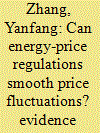| Srl | Item |
| 1 |
ID:
191393


|
|
|
|
|
| Summary/Abstract |
The implementation of China's energy-consumption permit trading scheme (ECPTS) is a recent initiative to accelerate energy transition towards carbon neutrality; however, its impacts on the economy and environment have not been well studied. A dynamic stochastic general equilibrium (DSGE) model is employed to estimate the macroeconomic effect of the ECPTS. The results show that in the short term, the ECPTS could obtain environmental dividends but fails to achieve the “Porter” effect, and its energy-saving effect is only significant over the long run. When combined with the implementation of carbon tax, the negative impact of the ECPTS on final output could be narrowed but a long-term loss of social welfare is inevitable due to labor transfer costs between energy firms. Moreover, a low-carbon energy structure could weaken the macroeconomic effect of the ECPTS, which is in line with expectations as China's energy transition aims to achieve large-scale development of renewable energy. The findings support the Chinese government to expand the regional coverage of the ECPTS and explore a coordination mechanism with carbon pricing policy. The government is also suggested to improve the legislation and supporting measures of the ECPTS to weaken its negative impact on the macroeconomy.
|
|
|
|
|
|
|
|
|
|
|
|
|
|
|
|
| 2 |
ID:
166351


|
|
|
|
|
| Summary/Abstract |
Due to the dominance of coal in China’s energy mix, coal prices have always been a challenging part of pricing reform. The recent frequent government interventions raise the key research questions: what is the actual impact of price policies on coal price fluctuations, and how can forward-looking pricing policies be made. By proposing a novel classification of coal pricing policies and introducing an expectation and forward-looking coefficient, the paper examines the relationship between coal price fluctuations and pricing policies using the generalized method of moments (GMM) method. It shows that the lagging coal price and coal demand play a positive role in regulating coal prices, while coal supply and marketization have significantly negative effects on coal price fluctuations. The heterogeneous impacts of price policies are due to differences in market players’ expectations, policy instruments and the methods of policy release. In addition, China’s coal pricing policy portfolio from 2013 to 2016 exerted synergy effects on the restraint of coal price fluctuations. As the forward-looking coefficient was considerably low, the government's intervention behaviors were obviously biased towards ex post facto responses. The paper suggests short run and long run policies to advance marketization of coal prices amid the energy transition.
|
|
|
|
|
|
|
|
|
|
|
|
|
|
|
|
| 3 |
ID:
180115


|
|
|
|
|
| Summary/Abstract |
While the retirement of fossil fuel capacity is an inevitable consequence of the energy transition to carbon neutrality, policymakers face challenges in setting the pace in order that the energy transition policies do not significantly damage the economy. This paper designs a dynamic stochastic general equilibrium (DSGE) model to examine the macroeconomic effects of coal capacity cut policy (CCP) shocks on the Chinese economy. The results show that: firstly, an energy policy shock can distort the transmission effect of coal supply and demand and other factors on coal prices. Secondly, the impact of different policy tools is significantly different on the macroeconomic system, in which the economic effect of advanced capacity replacement is the weakest. Thirdly, in the short term, no matter which policy tool is adopted, the CCP will inevitably lead to a reduction in social welfare levels. The study suggests that in the short term, the Chinese government can further release more replacement quotas of capacity with advanced production efficiency, and innovate other policy tools for coal industrial structural optimization and synergistic effects with environmental regulation. In addition, the results highlight the need for market mechanisms to further accelerate the energy transition over the long run.
|
|
|
|
|
|
|
|
|
|
|
|
|
|
|
|